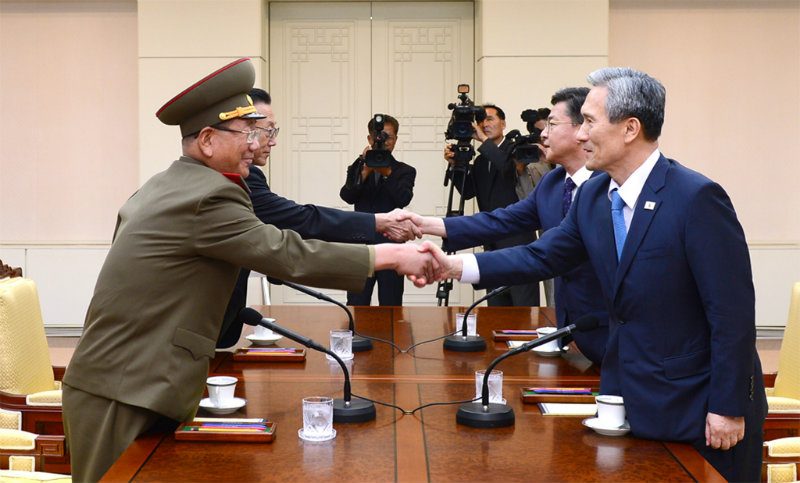SUMMARY
This is AI generated summarization, which may have errors. For context, always refer to the full article.

SEOUL, South Korea (UPDATED) – Top-level North and South Korean negotiators talked through the night with no sign of an agreement Monday, August 24, for ending a military standoff that has threatened to boil over into armed conflict.
After a 10-hour marathon the previous night, the talks passed the 16-hour mark in a second session in the border truce village of Panmunjom, where the 1950-53 Korean War ceasefire was signed.
The second round was clouded by South Korean claims that the North was seeking to influence the negotiating process with provocative military movements.
South Korea’s defense ministry said the North had doubled its artillery units at the border and deployed two-thirds of its total submarine fleet – or around 50 vessels – outside their bases.
“The North is adopting a two-faced stance with the talks going on,” said a ministry spokesman who described the scale of the sub movement as “unprecedented”.
“We take the situation very seriously,” he added.
The negotiations in Panmunjom are being led by South Korean national security adviser Kim Kwan-Jin and his North Korean counterpart Hwang Pyong-So – a close confidant of leader Kim Jong-Un.
Struggle for compromise
The grueling hours reflect the challenge of reaching a compromise, with both militaries on maximum alert and flexing their weaponry across a border that has already seen one exchange of artillery fire.
While the North moves around subs and artillery units, South Korean and US fighter jets have been carrying out simulated bombing sorties not far from the border.
The roots of the standoff lie in landmine blasts on the border earlier this month that maimed two South Korean soldiers.
Accusing Pyongyang of laying the mines, Seoul retaliated by switching on giant banks of loudspeakers that had lain silent for more than a decade and blasting high-decibel propaganda messages into North Korea.
The North denied any role in the mine blasts and issued an ultimatum for the South to halt its “psychological warfare” or face attack.
Analysts said the North would never apologize for the mine blasts, while South Korea would reject any compromise that might be seen to reward Pyongyang’s belligerence.
An ’emotional issue’
“The two sides may be able to come up with a statement in which some sort of ‘regret’ is expressed without explicitly naming the North,” said Jeung Young-Tae, an analyst at the Korea Institute for National Unification in Seoul.
“But I don’t think such a vague statement will work this time,” Jeung said, stressing that the case of the maimed soldiers – both of whom lost legs – had become an emotional issue in the South.
“So I think the best outcome of this meeting will be an agreement for another high-level meeting in the future, such as defense ministerial talks,” he added.
That would still leave open the issue of the propaganda broadcasts, which Seoul has vowed to continue.
UN Secretary General Ban Ki-Moon, a former South Korean foreign minister, urged both sides to “redouble” their efforts to reach a compromise.
Technically, the two Koreas have been at war for the past 65 years, as the Korean War ended with a ceasefire that was never ratified by a formal peace treaty.
There are nearly 30,000 US troops permanently stationed in South Korea, and the US military’s top officer on Saturday, August 22, reiterated Washington’s commitment to the defense of its ally. – Jung Ha-Won, AFP / Rappler.com
Add a comment
How does this make you feel?
There are no comments yet. Add your comment to start the conversation.